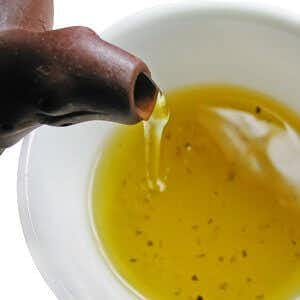
When you sit down to enjoy a beverage, do you think about whether it might affect the medications you take? Years ago, research on grapefruit juice showed that what you drink can indeed affect your pills. Coffee may also interact with some drugs. To begin with, it reduces absorption of levothyroxine. What’s more, fluoroquinolones such as ciprofloxacin or levofloxacin increase the effects of caffeine in the body. What about a beverage that is supposed to be extremely healthful? Does green tea interact with prescription medicines?
Which Medicines Does Green Tea Interact with?
Many people drink green tea hoping for health benefits along with a distinctive flavor. A new study suggests that you might best enjoy your green tea at least an hour before or after taking many medications (Clinical Pharmacology & Therapeutics, July 2025).
A review of studies, including some clinical trials, indicates that almost three-fourths of the prescription drugs studied are not absorbed completely when taken in conjunction with green tea. These include popular compounds like atorvastatin for cholesterol control, digoxin for heart failure, fexofenadine for allergies, lisinopril for blood pressure and raloxifene for osteoporosis. The decrease in absorption was highly variable, ranging from 18 to 99 percent. One compound, sildenafil, known by the brand name Viagra, had a 50 percent increase in absorption when taken with green tea.
Catechins Are to Blame:
The culprit seems to be EGCG (epigallocatechin-3-gallate) and related catechins. They seem to interfere with transport pathways that would get the therapeutic agent from the digestive tract into the systemic circulation. An accompanying editorial suggests that doctors might want to add green tea to their list of forbidden beverages with certain drugs, just as they may already tell patients to avoid grapefruit juice or alcohol.
How Does Green Tea Interact with Medications?
Q. After reading about green tea having a positive effect on vision, I wondered if there were any adverse interactions between green tea and prescription drugs. I take several heart drugs since having stents placed in 2012.
My Google search found an article suggesting it might interact with drugs. I’ve recently started drinking green tea, but I’m worried that it could interact with the beta blocker metoprolol I need to take. Should I not drink green tea at all?
A. We have seen only a few studies of the effects of green tea on vision. However, it seems that the polyphenol compounds in green tea can help protect retinal nerve cells (Pakistan Journal of Pharmaceutical Sciences, Nov. 2015).
Could Green Tea Interact with Metoprolol?
Luckily, green tea and EGCG do not appear to interact with metoprolol (European Journal of Heart Failure, May, 2008). Green tea does have other interesting interactions, however. It can lower concentrations of the beta blocker blood pressure drug nadolol (European Journal of Clinical Pharmacology, June 2018). This could make the drug less effective.
In a study, ten people were given either three cups of green tea or water daily for two weeks. Then they were given a single dose of nadolol. Those who had been drinking green tea had about 76 percent less medication in their bloodstreams later. Urinary levels were 80 percent lower. The researchers suggest that people who must take nadolol should probably stay away from green tea. Those in the green tea group got markedly less blood pressure lowering effect from the nadolol.
It has been known for years that green tea could dramatically lower levels of the chemotherapy drug bortezomib (Velcade). People who rely on this medication for treating multiple myeloma must not drink green tea.
In addition, green tea compounds might affect cholesterol-lowering drugs simvastatin and rosuvastatin (Journal of Food and Drug Analysis, April 2018). EGCG and other polyphenols may affect the microbiome of the digestive tract (Critical Reviews in Food Science and Nutrition, Aug. 26, 2019).
Citations
- Kyriacou NM et al, "Green tea catechins as perpetrators of drug pharmacokinetic interactions." Clinical Pharmacology & Therapeutics, July 2025. DOI: 10.1002/cpt.3547
- Jin J et al, "Bioactive compounds in green tea leaves attenuate the injury of retinal ganglion RGC-5 cells induced by H2O2 and ultraviolet radiation." Pakistan Journal of Pharmaceutical Sciences, Nov. 2015.
- Lorenz M et al, "Positive inotropic effects of epigallocatechin-3-gallate (EGCG) involve activation of Na+/H+ and Na+/Ca2+ exchangers." European Journal of Heart Failure, May, 2008. DOI: 10.1016/j.ejheart.2008.03.004
- Abe O et al, "Role of (-)-epigallocatechin gallate in the pharmacokinetic interaction between nadolol and green tea in healthy volunteers." European Journal of Clinical Pharmacology, June 2018. DOI: 10.1007/s00228-018-2436-2
- Werba JP et al, "Update of green tea interactions with cardiovascular drugs and putative mechanisms." Journal of Food and Drug Analysis, April 2018. DOI: 10.1016/j.jfda.2018.01.008
- Chen T & Yang CS, "Biological fates of tea polyphenols and their interactions with microbiota in the gastrointestinal tract: Implications on health effects." Critical Reviews in Food Science and Nutrition, Aug. 26, 2019. DOI: 10.1080/10408398.2019.1654430

